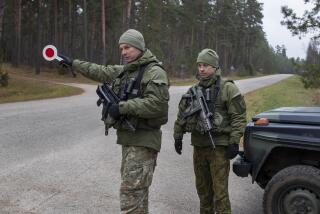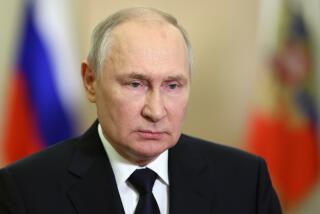New Soviet Moves Boost Pressure on Lithuania Leaders : Secession: In an action that could presage a takeover, Moscow sends in prosecutors, citing officials’ laxity. Landsbergis rejects talk of a breakdown of order.
- Share via
MOSCOW — The Kremlin, asserting that law and order is disintegrating in Lithuania, dispatched a flying squad of prosecutors to the breakaway Baltic state Thursday in what could presage an effective takeover by Moscow of the independent-minded government.
Soviet President Mikhail S. Gorbachev also turned up the pressure, demanding that the rebel republic’s leader, Vytautas Landsbergis, stop his countrymen from joining volunteer detachments being formed to replace KGB border guards and police.
In a telegram to Landsbergis, Gorbachev said: “I suggest that undelayed measures be taken to stop all actions at creating these and similar units. Please report fulfillment within two days.”
Speaking in Vilnius, Lithuania’s capital, Landsbergis rejected Moscow’s dire talk of a breakdown of order and said that pro-secession forces, which recently won a landslide victory in free elections, are very much in control.
“According to the position of the Soviet government, everything that is happening in Lithuania is illegal--even the fact that I’m sitting here,” said the music professor, who led his homeland into its declaration of independence from Moscow 12 days ago.
In a statement setting forth the rationale for tightened surveillance by Moscow, Prosecutor-General Alexander Y. Sukharev’s office contended that Lithuanian officials had become lax in safeguarding citizens’ rights and halting “extremist misdeeds.”
Sukharev’s office contended, without citing specifics, that many people in the republic of 3.7 million have complained of “flagrant violations of socialist legality,” rising crime and the actions of nationalists hostile to the Soviet army and government.
Lithuania’s chief prosecutor, Vidudis Barauskas, told the Supreme Council, the republic’s parliament, that he had been informed by Moscow that an 11-member team from Sukharev’s office would arrive soon.
The prosecutors’ mandate, in the terms set forth by Sukharev’s office, makes a mockery of Lithuania’s claims to independence and is another turn of the screw by the Kremlin to reassert control over the restive republic, which was annexed in 1940, along with Latvia and Estonia, under a secret agreement with Nazi Germany.
The statement from Sukharev’s office, carried by the official news agency Tass, demanded that prosecutors ensure strict observance of an article of the Soviet constitution requiring Soviet laws to be uniformly observed throughout the country, meaning Lithuanian legislation would have no special status.
Significantly, the Moscow-based prosecutors and their Lithuanian counterparts were ordered to enforce laws in line with last week’s decision of the Congress of People’s Deputies that found Lithuania’s independence proclamation illegal.
This would apparently require prosecutors to halt any action that the republic might take to assert its sovereignty.
Following Sukharev’s announcement, the Lithuanians moved swiftly to safeguard their independence. Barauskas, the republic’s chief prosecutor, was dismissed, and a prosecutor who had been working in the Lithuanian countryside, Arturas Paulauskas, was appointed to take his place.
“We hope this new person will be able to protect our decisions of the Lithuanian republic from outside attack,” Liudvikas Sabudis, the executive secretary of the Supreme Council, told a news conference in Vilnius. He said the Supreme Council was dissatisfied with Barauskas’ work but did not say why.
The new measures announced by Gorbachev and the prosecutor-general’s office came one day after the Soviet leader, using broadened powers he obtained when elected last week to the nation’s newly redrawn office of president, ordered Lithuanians to turn in all firearms and imposed controls on the entry of foreigners and border checks. Landsbergis objected that Gorbachev had no legal right to give orders to the citizens of an independent country.
“The statements on turning over hunting rifles are just ludicrous,” the president, a one-time concert pianist as well as professor of the history of music, told reporters. “Our revolution is not a revolution of bullets. Our revolution is a revolution of song.”
Nonetheless, the chief of Lithuania’s military auxiliary force, created to prepare young men for the Soviet armed forces, told Parliament that he had handed over his training arsenal to the Soviet army under threat that it would be seized if he did not.
“I was summoned by the commander of Soviet ground forces, army Gen. Valentin Varennikov, who told me to inform the Supreme Council that if the weapons were not handed over, they would be taken by force,” Gen. Ginutis Taurinskas said. “I issued such an order, and all organizations handed over all weapons to military organizations today.”
Taurinskas said he was ordered to relinquish all small-caliber weapons to prevent “theft of arms for inappropriate use.”
Seventeen armored personnel carriers were handed back to the Soviet army, Taurinskas said, but some firearms remain scattered among the 500 to 600 units of the Lithuanian branch of the Voluntary Society for Cooperation with the Army and Navy.
Deputies harshly criticized Taurinskas, saying that he no longer had to obey orders from the Soviet army.
“The Supreme Council has adopted a resolution that everything on the territory of Lithuania is the property of the reinstated Lithuanian state,” Kazimieras Motieka, a member of the Presidium, told Taurinskas. “You should have contacted the Lithuanian government.”
Lithuanian Interior Minister Marionis Myasyukonis told the Associated Press that there are about 30,000 officially registered shotguns, mostly in the possession of hunters or collectors. Vremya, the Soviet television news program, reported two shooting clubs had handed over their guns in compliance with Gorbachev’s order, but it was unclear how many other Lithuanians were doing so.
Vilnius residents were rattled Thursday afternoon when a column of Soviet armored personnel carriers and army trucks drove through the city center in an apparent show of force. Lithuania’s prime minister, Kazimiera Prunskiene, complained of increasing activity by Soviet soldiers, which she estimated to number 30,000 in the republic. She sent a telegram to Gorbachev demanding that he explain.
However, Gennady I. Gerasimov, the Soviet Foreign Ministry spokesman, reiterated Moscow’s assurance that there are no plans for the use of force.
“We want to solve this problem as peacefully as possible and according to the laws of the country,” he told a news briefing in the Soviet capital.
One group of Vilnius residents felt especially targeted by Gorbachev’s directives: the dozens of Westerners of Lithuanian origin who have returned to their forefathers’ homeland to do their part for independence.
One foreigner said the group of Americans, Canadians and other nationalities felt they had been singled out in Gorbachev’s decree, which instructed Soviet authorities to expel people whose visas are not in order.
“It’s part of the entire picture,” said Aidas Palubinskas, 20, of Huntington Beach, Calif. But he added: “If they want to enforce those threats, they’re going to have to use serious force, and that’s something I don’t think they want to do.”
Palubinskas works in the newly created Lithuanian government Information Center and also is one of the founders of the republic’s new Christian Democratic Party.
Ginte Damusis of the Lithuanian Information Center in Brooklyn, N.Y., estimated that 20 Americans and Canadians of Lithuanian origin are enrolled at Vilnius University and that many are doing volunteer work for the Landsbergis government. An American lawyer, she said, is advising officials on constitutional reform and how to negotiate with Moscow.
In neighboring Estonia, Communist candidates, most of them supporters of independence for the Baltic republic, won 60 of 105 seats in the republic’s Parliament, final results from Sunday’s election showed Thursday.
The official vote count was issued at the same time as the results of a public opinion poll showing that 61% of the republic’s residents surveyed last month support independence, according to United Press International. The poll showed that 84% of native Estonians but just 18% of the Russians and other non-native ethnic groups in Estonia favor independence. Leaders in Estonia have said they will seek to avoid confronting Moscow over independence. Free-lance journalist Esther Schrader, in Vilnius, contributed to this report.
More to Read
Sign up for Essential California
The most important California stories and recommendations in your inbox every morning.
You may occasionally receive promotional content from the Los Angeles Times.













